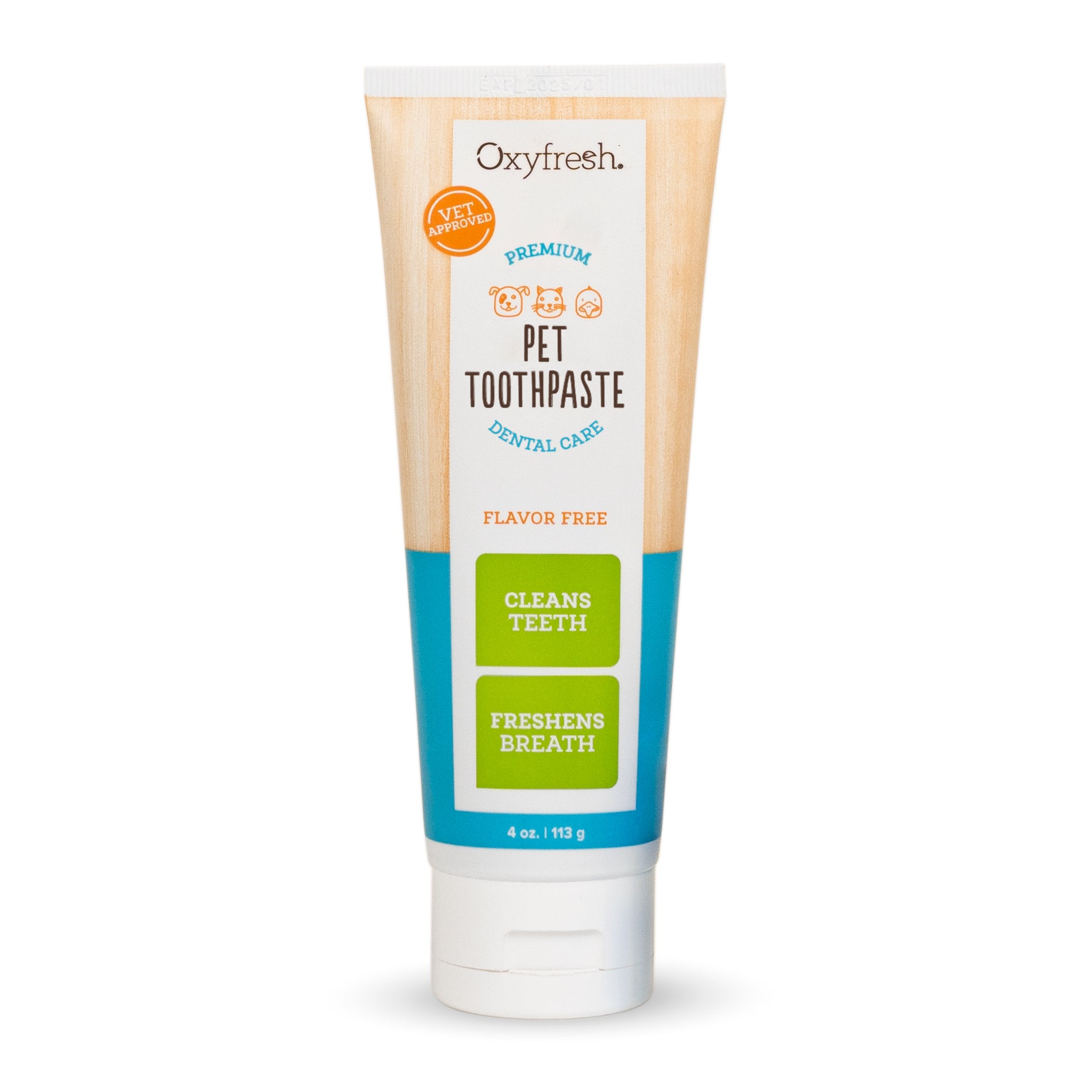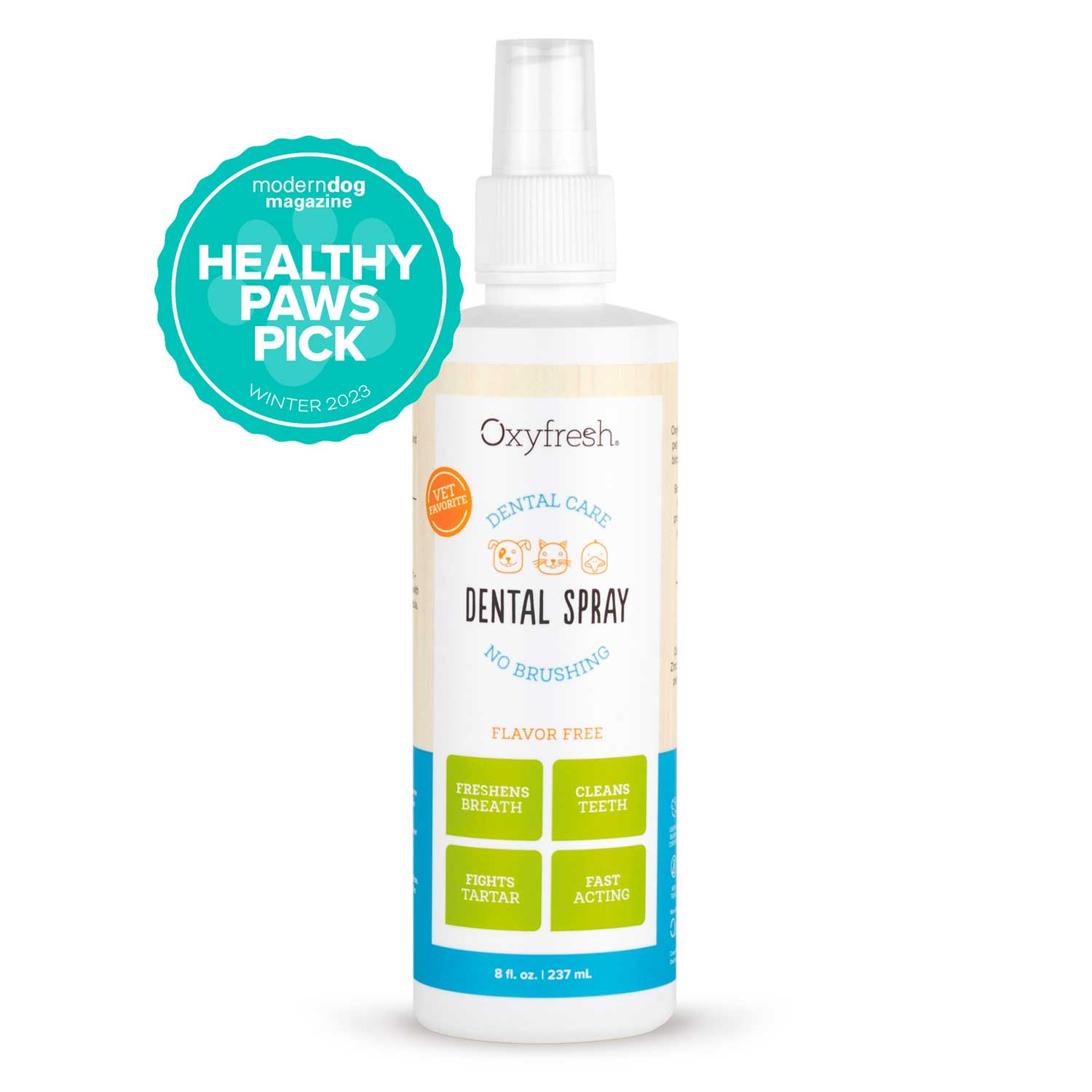Eww, why does my cat’s breath smell so bad? We’ve ALL been there, dealing with stinky cat breath. And we know how it can make us a little crazy and scrolling the internet for answers. Well, we're making it super easy for you to get the information you need. Rest-assured, the reasons for stinky cat breath are usually simple, and there are easy solutions to take care of the problem, fast.
Stinky Cat Breath Is a Big Deal
Any kind of bad breath radiating from your cat can impact your quality time together. And as cat people, we get it: not being able to cuddle is NOT ok! Beyond the unpleasant smell, cat bad breath can indicate a current health problem or lead to future health problems if you ignore it. Luckily, there are simple solutions to fix your cat’s fishy breath, including one that takes just 10 seconds a day.
First, What Should a Cat’s Breath Smell Like?
Wondering what’s normal when it comes to cat breath? Here’s the scoop: Unless they just ate, your cat should have more of a neutral smell or slightly sweet smell to their breath, kind of how a baby’s breath smells. It’s smart to get in the habit of intentionally smelling your cat’s breath (we know, kind of weird), but this will give you a baseline of what’s normal for your cat.
Friends talking about your cat’s cringey breath?
If you've been noticing your cat's fishy breath, chances are your friends have too. Actual descriptions of people describing cats’ breath:
- "Absolutely rancid breath"
- "Like tuna on the comforter"
- "Reeks of kibble and salmon"
- "Cat breath smells like rotten meat"
- "Putrid – cat’s breath smells like death"
Why this matters: when a cat's breath is fresh, they are actually happier and probably healthier.
Why Does My Cat’s Breath Smell So Bad?
Smelly cat breath can be caused by several conditions, but the most common cause is poor oral hygiene. Imagine if you neglected your own teeth for months, years or even a decade. Bad breath would be your constant companion, and it’s no different for our cats.
- Gingivitis: This is the first of four stages of gum disease, marked by red and swollen gums and plaque covering the cat’s teeth.
- Advanced periodontitis: This is the last stage of gum disease, where bacteria from infected gums can cause tooth loss, ultra stinky cat breath, and kidney & heart damage.
- Other dental problems: Mouth ulcers or lesions can cause a cat to have bad breath.
- Foreign object: If a piece of string, a strand of hair, or other object gets lodged in your cat’s teeth, it can begin to decompose and cause a stink.
- Health conditions: Certain conditions will give a cat bad breath, and the smell is often distinct: diabetes = fruity breath; kidney disease = cat breath smells like ammonia or urine; liver disease or intestinal blockage = cat breath smells like poop. If you smell any of these distinct smells, make an appointment with your cat’s vet.
Why does my cat's breath smell like fish?
Fishy cat breath is most likely due to dental issues, but there are other circumstances that can cause a fishy odor to emanate from your cat.
- Wet food lingering: Diet definitely plays a role in a cat’s breath. Fish-based cat food and treats can leave a lingering fish smell, and the smell is worse with wet food vs. dry food.
- Anal glands: If your cat needs their anal glands expressed, one of the symptoms will be a strong fishy odor. However, the fishy smell should be coming from their backside and not their mouth.
- Kidney problems: A cat with kidney problems will have breath that smells like ammonia, which many describe as a fishy smell. If the kidneys aren’t properly filtering waste, the buildup of toxins can be smelled on their breath.
- Respiratory infection: If your cat has a sinus or upper respiratory infection, this can cause their breath to smell like fish.
What to Know About Cat Gingivitis
Remember: poor oral hygiene is the number one cause of stinky cat breath, and it starts with gingivitis, characterized by swelling of the gums. Quick facts about gingivitis:
- 85% of cats have gingivitis by age three
- It’s 100% reversible with cat gingivitis home treatment
- Left untreated, it will progress to more serious forms of gum disease (periodontitis) and affect your cat’s quality of life & even their lifespan
What causes cat gingivitis?
Gingivitis in cats is caused by a buildup of plaque in the cat’s mouth. Here’s the reality: There is NO way to avoid plaque in your cat’s mouth. This sticky, filmy substance naturally forms after a cat eats. Therefore, it’s not about avoiding plaque completely, but making sure to remove it, preferably every day. If plaque isn’t removed, it will quickly harden into tartar buildup on your cat’s teeth. Tartar, aka calculus, is a hard yellow or brown substance that can no longer be removed at home. It requires a professional cleaning, which isn’t fun for the cat OR your bank account. (Average cost is around $300-$400 depending on where you live, age of your cat, etc.)
How to tell if your cat has gingivitis
- Cat breath stinks – this is often the first sign
- Plaque on cat’s teeth – clear or creamy colored film
- Swollen or red gums (healthy cat gums are bubble-gum pink)
Reminder: gingivitis is completely reversible with good oral care. However, if you let it advance into periodontal disease, you’ll notice other symptoms too.
Signs of periodontal disease in cats
- Cat drooling
- Blood in saliva
- Pawing or rubbing at the face
- Changes in eating: dropping food, refusing food, chewing on one side of the mouth
Periodontal disease is extremely painful for cats. To put it bluntly, the teeth are actually separating from the gums. It can also take years off their lives because harmful bacteria can travel all through the cat’s bloodstream and damage their vital organs. If you notice any of these signs of periodontal disease, get them into the veterinarian right away.
5 Solutions for When Your Cat’s Breath Smells Like Fish
#1. Brush Your Cat’s Teeth
Toothbrushing is the best way to remove plaque from a cat’s teeth at home and get rid of fishy cat breath. Unfortunately, most cats are a little sus about the toothbrush and make the process difficult for their parents. If you’re willing to give it a go, follow these tips:
- Traditional toothbrushes can be too bulky for a cat’s mouth. Get a finger brush instead.
- NEVER use your own toothpaste on your cat – ingredients like fluoride & sweeteners can make cats sick. Instead, use a pet toothpaste. Flavor free is best for picky cats.
- Brush at least 3x a week to see results.
- Just focus on the outside surfaces of the teeth, as well as the gums. This is where plaque is heaviest.
- Be kind to yourself: it may take a few tries for you and your cat to get the hang of things.
#2. Use a Cat Breath Freshener Spray
Spritzing your cat’s teeth and gums with a high-quality breath freshener is a quick and easy way to dial back the stinky cat breath. The ingredients in the spray will help to target the bacteria that lead to plaque and fishy cat breath when used consistently. But word to the wise: Get a flavor free Cat Dental Spray. Cats don’t like the taste of menthol!
#3. Explore Cat Bad Breath Treats (But Keep Expectations in Check)
If only fresh cat breath were as simple as giving them a treat, but in truth, many cats just swallow dental treats whole and don’t get any of the chewing, plaque-scraping action, which defeats the purpose. If you want to go the treat route, look for the VOHC label on the bag – it means the product has been tested and shown to reduce plaque. Pointers for using cat bad breath treats:
- Make sure your cat actually chews the treat.
- Use treats in conjunction with a daily dental product. As a standalone solution for stinky cat breath, they are not very effective.
- Read the recommended daily amount & ingredient list. You don’t want a chunky cat, as that can bring other problems to the table.
#4. If Your Cat Needs a Professional Dental Cleaning, Don’t Delay
If your cat has a buildup of rock-hard tartar on their teeth, a professional cleaning will be needed to remove it. Yes, it's spendy, but this will give your cat a fresh start and then you can start a home dental routine that can potentially reduce or eliminate the need for cleanings in the future. Note: If your veterinarian recommends a professional dental cleaning, don’t blow it off. Your cat’s breath and oral health will only get worse, which can make the cleaning more expensive later on if tooth extractions are necessary.
#5. Give Your Cat a Dental Water Additive
If your cat will not tolerate a toothbrush, don’t panic! The easiest, most hands-off way to care for your cat’s smile at home with MAXIMUM results is by giving them a cat water additive. As the name implies, you just add to your cat’s water bowl or filterless fountain each day, and they can drink their way to fresher cat breath and cleaner teeth. Seriously, it takes mere seconds!
Cat Breath Stinks? Fix it Fast with Oxyfresh Pet Dental Water Additive.
Not just any water additive will do when it comes to fixing that fishy cat breath. You’ll want a safe, proven, HIGH QUALITY water additive, like Oxyfresh Cat Water Additive. Unlike other water additives, Oxyfresh Cat Dental Water Additive is 100% free of flavors and scents so even the pickiest cats won’t know it’s in their water. Best of all, it’s so easy. Just add to their water each day and call it good. 10 seconds is all it takes!
- FORMULATED WITH OXYGENE®: This proprietary ingredient is proven to target the bacteria that cause plaque & bad breath. No other brand has it!
- SAFE & NON-TOXIC: Free of mint, green tea, and fishy flavors. Only the best for our loveable cats!
- EASY CAT DENTAL ROUTINE: No fussin’, no tooth brushin’ ... just pour into your cat’s water and let the fresh breath begin.
- IT WORKS: Veterinarians recommend it, and cat parents love it! Proven product in the Oxyfresh family of pet dental products since 1994.
#1 Water Additive & Walmart Exclusive
Oxyfresh Cat Dental Water Additive is the #1 cat dental water additive on the market. Here's what fans are saying:
"Highly Recommended"
My cat’s breath STANK. Literally 2 weeks later & her breath doesn’t smell at all. Highly recommended!!! – Abby
⭐️⭐️⭐️⭐️⭐️
"Way Better Breath"
My cat’s breath has improved a lot! I used to smell the nastiness when they were just yawning, but now it’s way better! – Gelsey K.
⭐️⭐️⭐️⭐️⭐️
"Great Alternative to Brushing"
This product is a great alternative if you don't own a suit of armor and are considering brushing your cat’s teeth. – Curtis C.
⭐️⭐️⭐️⭐️⭐️
Fresh cat breath without all the toothbrushing drama. Isn’t it time you took the plunge and tried a water additive for your cat’s fishy breath? Your cat will thank you ... with some fresh kisses, of course! xo









